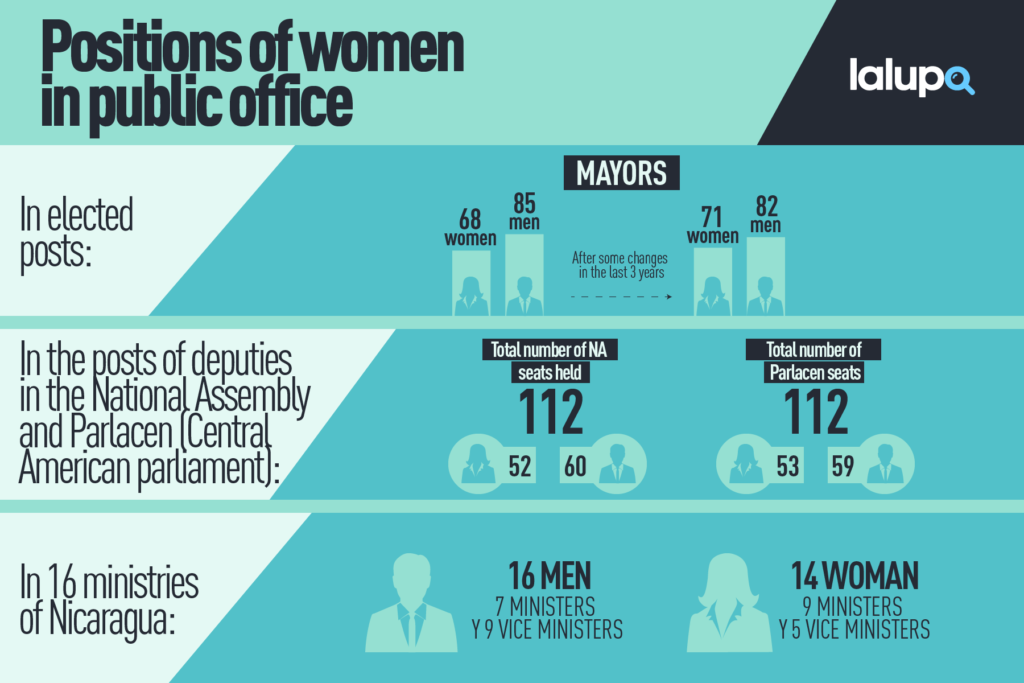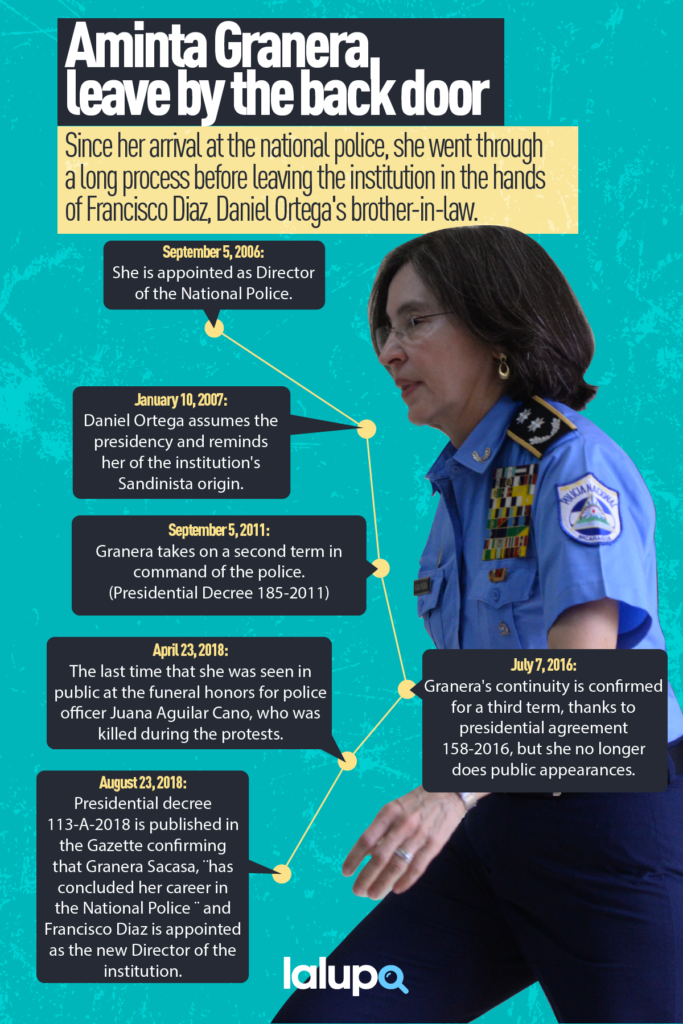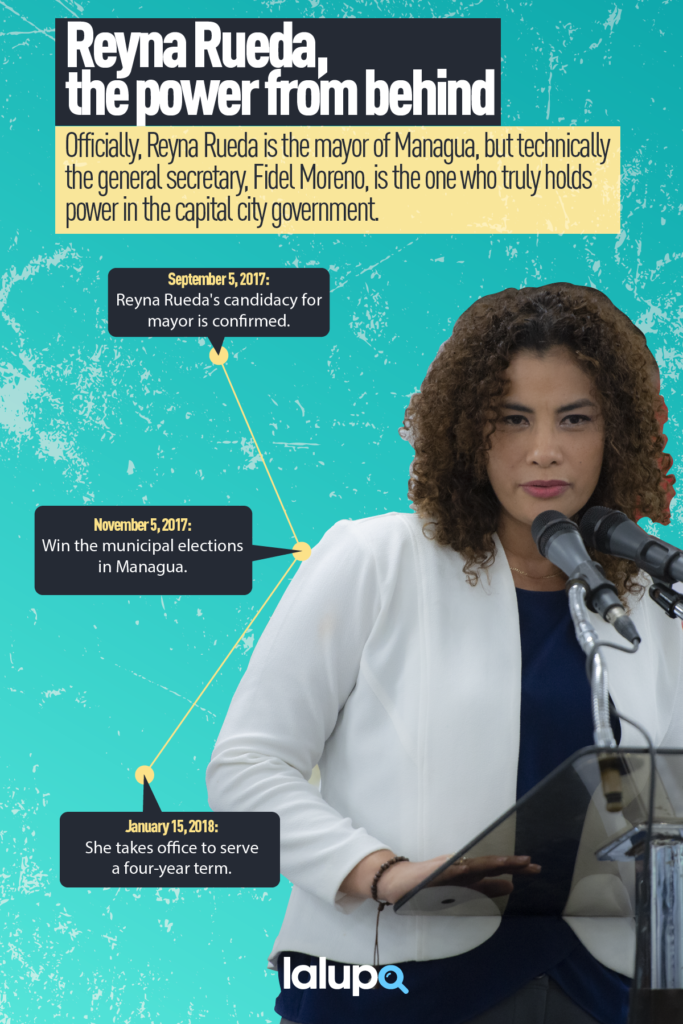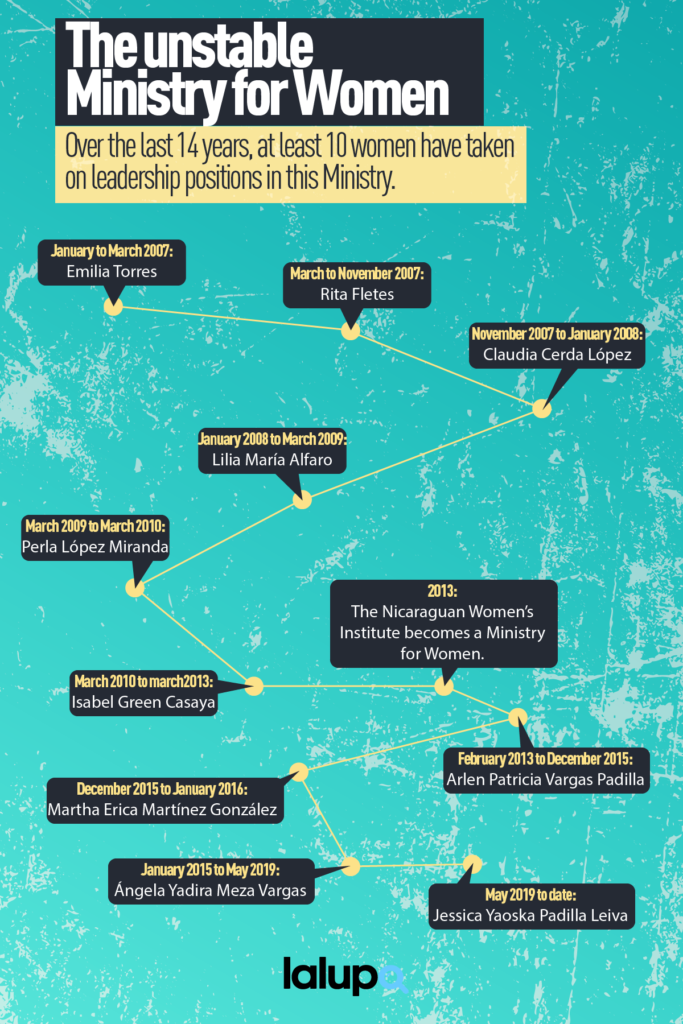#8M: 50% of public positions held by women, but without decision-making power
Even though women in public positions are more conspicuous, few are publicly known by first and last names, nor are their achievements known.

Even though women in public positions are more conspicuous, few are publicly known by first and last names, nor are their achievements known.

The regime of Daniel Ortega and Rosario Murillo established by law «gender equity» in Nicaragua. With Law 50-50, which reformed the Law of Municipalities or Law 40, women began to gain spaces in the mayoralties of Nicaragua, but in exchange for having a “designated, clientelist and partisan” presence in public office, affirms the sociologist and feminist.
The reform, approved on March 8, 2012, established the so-called policy of distributing 50-50 positions of public election, that is, half men and half women. The application in the municipal governments, in some way, contributed to equalize the gender composition of the authorities in the Municipal Councils, although this does not mean that women were given real power.
«They are women who are only there, because they were put in place by the government party and who are more than anything like a mask, they are symbolic women who serve to mask and give the face that here there is parity in the participation of women and to hide or wanting to show a supposed democratic will on the part of the Government,” says Montenegro.
Even though women in public positions are more conspicuous, few are publicly known by first and last names, nor are their achievements known. They do not provide interviews, and the reports from the ministries they lead are communicated by the spokeswoman for the Sandinista regime, Rosario Murillo, who, along with Daniel Ortega, has been accused of moving them like chess pieces.
You can read: Romanticism for the Revolution makes it difficult to denounce the dictatorship in Spain
Thirteen years have passed since the approval of the Law on Equal Rights and Opportunities – Law 50/50 -. However, the long-awaited gender equality in all areas; political, social and economic continues “an outstanding debt with women”, although for some organizations, the “situation has worsened”.
Although theoretically the participation of women was expanded, those who occupy a position in the Municipal Councils are still subordinate to the male leadership in those spaces and are not in the «capacity to decide.»
The sociologist believes that the regime tries to exhibit a «supposed parity» of gender, which in reality «lacks institutional support, political credibility or authority.»
“It is rather a strategy of disaggregation of the public patriarchy, by means of which women are not prevented from entering the state public space, but where control and the best positions are held by men,” explains Montenegro.

Women who hold public office «enter in a subordinate way,» says the sociologist.
«In the end, they are all subordinate, because the only power that is obeyed, one has absolute obedience, is that of Daniel Ortega and his wife, in two dishes that is,» says Montenegro.
The teacher, sociologist and feminist activist who directs La Corriente, María Teresa Blandón, clarifies that the approval of legislation that favors gender parity “is not a favor” of a government, but is “the object of long feminist struggles and demands because the work of women is recognized”.
It points out that –because of the context in which Law 50/50 is applied– “it is just a mirage, which means that the regime does not lie when saying that these years the participation of women has significantly increased, but it is not like that. in making decisions».
The study “Without a Republic and without citizenship. Political participation of women in Nicaragua in the legal and political context of 2014”, from the Center for Constitutional Rights, revealed that the implementation of Law 50-50 has not changed the “condition of gender subordination, although the number has changed. correlation in favor of women”.
In the findings, which were recorded from interviews and focus groups, the study, which was led by Montenegro, highlights that women have «little margin for decision-making» in political spaces and, evidently, control continues to be in the same way. firmly in the hands of men.
“At the local level, these women have neither autonomy nor representation, nor the ability to decide anything, because they are completely subordinate (…) let’s no longer talk about participation as deputies in the National Assembly, which is absolutely useless, because no one there decide, who decides is Rosario and Daniel Ortega. Everything is pure appearance”, emphasizes Montenegro.
At the level of municipalities and State institutions, some women who have held important positions have finally been relegated and forced to obey the dictatorial couple with submission.

On September 5, 2006, Aminta Elena Granera Sacasa was appointed director of the National Police, in the last stage of the Government of Enrique Bolaños.
Her appointment generated great expectations, since she received a totally delegitimized institution and it is assumed that she would end police corruption, as well as guarantee professionalism within the police ranks.
The police chief became a respected person in Nicaragua, to the point that she, in the polls, led the list of public figures with a favorable opinion ahead of Ortega and Murillo himself.
In 2007, with the arrival of Daniel Ortega to power, the first police commissioner submitted to the authoritarianism and arbitrariness of the regime. During the inauguration, Ortega swore in the head of the National Police and reminded her of the institution’s Sandinista roots.
Granera Sacasa, little by little, was stripped of its authority and performed only public relations functions. Some police sources began to claim that she held a position of adornment.
In 2011, Ortega extended Granera Sacasa as head of the National Police and ratified it again in 2016, despite the fact that the decision was not legal. Some security analysts saw that the intention was to wear down any presidential pretense of this woman.
Granera Sacasa bowed to Ortega’s decisions and remained silent in the face of events that the entire society repudiated, such as the El Carrizo massacre (2011), the brutal attacks and robberies of the #OcupaINSS protests (2013) and the Jagüitas massacre (2015), to name a few.
After she assumed the third term of her management in that institution, the public activities in which she participated were easily counted. Behind the police chief was always the male figure of Commissioner General Róger Ramírez Guzmán, who it is said was the one who exercised the real command within the police structure.
Ortega prepared the way for his father-in-law Francisco Díaz, sending several deputy directors of the Police to retirement, including Ramírez Guzmán.
Granera Sacasa gradually lost control of the Police, the openness that she had with the population and the media. She no longer appeared at any public activity, and after 2015 her absence was more noticeable.
Also: Marta María Blandón: «Women matter only when they are at the service of the dictatorship in power»
In April 2018, she was silent and did not comment on the massacre carried out by the regime against the population.
Díaz was the one who appeared in public justifying the murders through appearances at the face of the official media.
One of the last public appearances of Granera at the head of the Nicaraguan Police, occurred on April 23, 2018, when she participated in the funeral service of the police Juana Francisca Aguilar Cano, who died during the protests against Ortega.
At the end of April 2018, it transpired that Granera Sacasa resigned from her position, while the country was in full turmoil and immersed in an unprecedented crisis.
On August 23 of that same year, through a presidential agreement published in La Gaceta, it was announced that Granera Sacasa had “concluded her career in the National Police” and her retirement was confirmed.
In September of that year, Díaz assumed the leadership of the public institution. A position that she in practice held long before.

The study conducted by Montenegro revealed that “putting and removing” officials in a whimsical way and without giving any kind of explanations, going over the government bodies of the municipalities, discourages the participation of women.
Although in the last elections of 2017, women reached more than 40% participation in the 153 municipalities of the country, their contribution to decision-making remains limited, as in the case of the current mayor of Managua, Reyna Juanita Rueda Alvarado.
It is said that he is a man of confidence of the spokeswoman of the regime, Rosario Murillo, completely overshadowing the figure of Reyna Rueda.
Rueda who began to have an outstanding voice when she served as secretary of the Managua Municipal Council in the previous administration, since she assumed her new position as mayor since January 4, 2018, now she limits herself to making tours of the markets and only has protagonist in the sessions of the Mayor’s Office, when he reads the agenda and moderates the interventions.
While, Moreno is the only one authorized to give the reports, which is the responsibility of the mayor by law. He is the figure in the Mayor’s Office that reports on catastrophes, floods, announces winter plans and agreements with different agencies.
When journalist Daysi Torres took office on July 7, 2009, replacing the dead Alexis Argüello, the story was the same that Rueda is repeating now.
Moreno, considered the “de facto mayor”, has been the main voice within the commune ever since.
The Ministry of Women, formerly called the Nicaraguan Institute for Women (INIM) that was created in 1987, is an institution that remains in constant instability, since Daniel Ortega came to power, through which more than 10 directors have passed.
Emilia Torres, was the first director of INIM, for a few months, at the beginning of Ortega’s mandate in January 2007, but she was removed from her position in March, under the pretext that she passed to the Ministry of Culture.
That same year, at least three women held that position at INIM, including Rita Fletes (R.I.P), who was there until November and was replaced by Claudia Cerda López, who held the director’s chair until 2008.
Later, Lilia María Alfaro took office, until March 2009, when she was replaced by Perla López Miranda, who was there until March 2010.
At the Institute, which was supposed to ensure gender equality in the State, the changes continued to be active. Gustavo Porras’ sister-in-law, Isabel Green Casaya, assumed the leadership of INIM until 2013, when the institution was renamed and Arlen Patricia Vargas Padilla was appointed minister.
The changes continued and on December 17, 2015, Vargas Padilla was replaced by Martha Erica Martínez González, who was removed from the position after one month and two days after being assigned, and in her place was replaced by Ángela Yadira Meza Vargas in 2016.
The last woman to assume the position of that unit was Jessica Yaoska Padilla Leiva, appointed on May 7, 2019.
This ministry, in theory, is responsible for formulating, promoting, coordinating, executing and evaluating government policies, plans, programs, and projects that guarantee the “participation of women in the process of economic, social, cultural and political development of the country». But in practice there are no results.

«They are not real, they have no hold, they have no impact, practically (the Ministry) is a shell and is demolished, what there are, employees who in the end are supernumerary, I do not think they do absolutely anything more than proselytism and activism in favor of the Government”, criticizes Montenegro.
The sociologist affirms that women in reality are nothing more than «objects that can be manipulated by the lady with the hand of the rings», which is the one who in practice manages the «bureaucratic changes within the institutions».
It may interest you: Women from here and there who fight for the rights of migrants
«They are irrelevant, they are interchangeable, they are disposable, they pass without shame or glory, because there is no merit, there is no representation, and there is no capacity in terms of deciding, they have been chosen», argues Montenegro.
An exhaustive review of La Lupa shows that the presence of women in public office is significant. Both deputies and mayors or vice mayors and ministers exceed 40% of representation.
Although it is described as «an insufficient measure» for a public policy specialist who spoke with La Lupa on condition of anonymity for fear of repression against critical voices in Nicaragua, she points out that «on paper it is progress.»
“It does not level the political playing field specifically, because you can have 50 women and 50 men legislators, you can have 50 women mayors and 50 men mayors in the case of municipalities, however, that is not enough to say that women are making decisions. or that they have real power to make decisions, «he says.
These increases in political participation, although numerically they show improvements, for the specialist in public policies point out that they are actually positions that «are subordinate to the decisions of the ruling party … because parallel authorities are imposed on them by the centralization of power that even their functions are canceled ”.
Law 50/50 sought – according to what has been proposed since its approval in 2008 – to guarantee equitable participation for women, especially in popularly elected positions and appointments. Therefore, months before the municipal elections of 2012, it brought a reform to the Municipalities Law and the Electoral Law, which forced the political parties to reform their proposals for candidacies.
After these changes, which brought about a considerable increase in the participation of women, at least quantitatively, Nicaragua began to rank in the renowned report of the World Economic Forum (WUF, for its acronym in English) – The Global Gender Gap Report 2013 – which ranked the country, for the first time, in the exclusive Top Ten, after ranking 90 in 2007.
«Nicaragua continues to be the most advanced country in the region in terms of gender equality, ranking tenth in the world index,» says the 2013 document when it ranked tenth. And a year later it rose 5 positions.
The 2013 report ranked 136 countries “according to their ability to close the gender gap in four key areas: health and survival; educational achievements; political participation and economic equality ”.
For Blandón, these evaluations, where only purely quantitative aspects of women’s participation are taken into account, «cannot show the true meaning of strengthening gender equity.»
The public policy specialist also points out that this type of ranking «does not measure the quality of life of these women, nor the decision-making capacity that they are given in those positions that they measure by numbers.»
However, from the regime, year after year the “participation of women” in public positions is celebrated even though it is Murillo who concentrates the information and power, and the rest of the civil servants go into the background, and appear only at parties popular or minor acts, according to the official media.
The data reveal that in the 16 ministries the presence of women in senior positions is 46.6%, that is, 14 women hold positions as ministers and vice ministers. In five of these ministries; Women, Health, Family, Environment and Natural Resources, women who held positions as ministers or vice ministers were removed – in at least three cases – before they had completed one or two years in office. And it is well known that the portfolios they manage are those that are traditionally assigned to women.
In the case of the National Assembly, the situation is quite similar, in few occasions the voice of the deputies or alternates is heard, and that 46.4% of the seats are held by women in the national, departmental, regional and regional councils. of the Central American Parliament, in the case of the proprietors, while in the case of the alternate deputies it rises to 47.32%.
In the case of the positions of mayors and vice-mayors, women obtained in 2017 -after the questioned municipal elections- a participation of 44.4% in the position of mayors, that is, 68 of the 153 positions were held by women.
In the last three years, five of the 153 municipalities have undergone changes: one due to the death of a Sandinista mayor; another for the dispossession carried out by the regime and three related to resignations due to alleged health or retirement problems. These situations led to a quantitative increase of 2% in the participation of women in the position of mayor or vice mayor.

In 2007, Ruth Selma Herrera, a researcher on water and sanitation issues, assumed the executive presidency of the Nicaraguan Company of Aqueducts and Sewers (Enacal), but she was in office until April 8, 2010.
Herrera argues that the «system» reduces the good performance that a woman can have in a management or Ministry position. The former executive president of Enacal believes that Law 50-50 is part of the «political propaganda» promoted by the regime.
“Neither this Government, nor that of (Enrique) Bolaños, nor that of (Arnoldo) Alemán, nor that of Doña Violeta (Barrios de Chamorro), nor that of (Anastasio) Somoza, have done anything to really claim that recognition respectful, real. It has always been handled, even with this Government, as a political propaganda to throw the story at the national level, and at the international level, like that here women are given the opportunity ”, Herrera mentions.
The former executive president of Enacal, considers that the legislation that the regime presumes so much, was approved by «pure formality», because if they put a woman in a position and do not listen to her proposals, they do not respect and support her, the appointment becomes » A big lie».
«I believe that here there are many women who have been figurines in the institutions and that in the end others are behind the decisions, not only in the Mayor’s Office of Managua, in a lot of institutions and it depends on whether one wants to be,» he says.
Herrera resigned after considering that it was the opportune moment. “I did what I think I had to do and I quit when I felt I had to quit. I have to make my voice heard or if I do not resign from the position, you cannot be in a position because they put you there, to earn the money and to say that there are women, and here women, sometimes, disrespect themselves when they accept to be puppets of any government that appoints them, they do not let them decide and then they put an advisor”, he questions.
According to Montenegro, the numerical presence of women within a «patriarchal, authoritarian regime does not modify it or make it democratic.»
“Gender parity loses all meaning when the regime lacks legitimacy of origin, legitimacy of the process and legitimacy of the result, because the lack of independence of the powers prevents compliance with the responsibility of accountability between the powers of the State and the citizenship and absolute power is exercised as a form of domination”, Esteem Montenegro.
